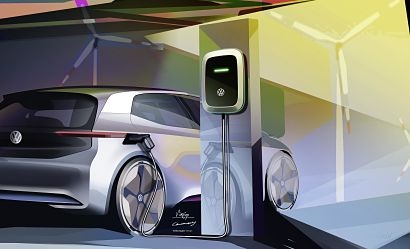
The carbon footprint of the new vehicle will be improved by more than 1 million tons of CO2 per year, roughly the impact of a coal-fired power plant supplying 300,000 households with electricity. The company is also working on a comprehensive decarbonisation programme that will cover other models. It will also offer more than 20 fully electric models by 2025.
“Climate change is the greatest challenge of our times” said Thomas Ulbrich, the Board Member responsible for e-mobility at the Volkswagen brand. “As the world’s largest car manufacturer, Volkswagen is assuming responsibility: The new ID. will be the Group’s first climate-neutrally produced electric car. To ensure that it remains emission free during its life cycle, we are working on many different ways to use green power. Truly sustainable mobility is feasible if we all want it and we all work on it.”
Georg Kell, the founding director of the U.N. Global Compact and spokesperson for the Volkswagen Group Sustainability Council, added that CO2 emissions produced by humans must be reduced as quickly as possible and that since its foundation, the Volkswagen Sustainability Council has worked hard to ensure that the company makes climate protection one of its strategic priorities. Volkswagen is taking the right approach with its electric offensive and the ID. Now it’s time to powerfully put this plan into motion.
For the ID., Volkswagen has focused the entire value chain on the goal of avoiding and reducing CO2 emission. The battery cells will be produced in Europe, the energy will come from green power sources. More savings potential in the supply chain that extends all the way back to raw material production is being examined with the help of direct and indirect suppliers. The plant in Zwickau is already using externally produced power from renewable sources. Unavoidable emissions in the manufacturing process are offset by investments in certified climate projects. As a result, the ID. will be manufactured CO2 neutral right from the start.
For charging, Volkswagen recommends the use of energy from renewable sources like wind power and hydro-power. The new Volkswagen subsidiary Elli has recently begun to offer regeneratively produced electricity called Volkswagen Naturstrom. The Ionity fast-charging network created by Volkswagen and other car manufacturers will offer green power at about 400 charging locations on European motorways – wherever available.
Volkswagen expressly supports Germany’s planned transition to sustainable energy supplies. Even beyond the energy transformation, the breakthrough of electric mobility can be achieved only in an alliance with political leaders. From residential property law to the expansion of public charging infrastructure, the goal should be to quickly remove the barriers standing in the way of electric cars.
Volkswagen wants to make the electric car attractive and affordable for as many people as possible. The compact ID. will roll off the assembly line in Zwickau starting in late 2019. The SUV ID. Crozz, the ID. Buzz and the sedan ID. Vizzion will follow soon thereafter. The Volkswagen brand alone plans to invest about 9 billion Euros in e-mobility by 2023.
For additional information:

